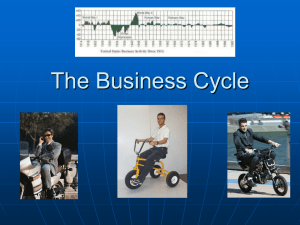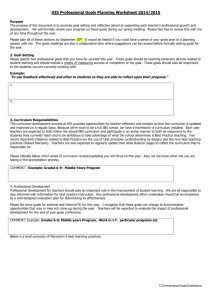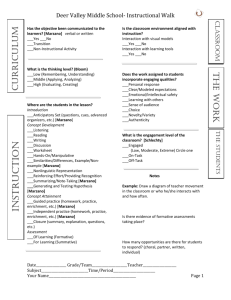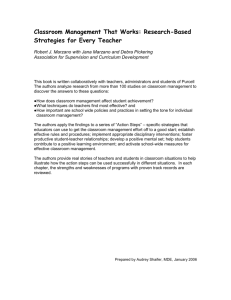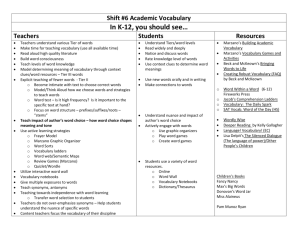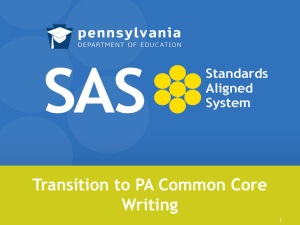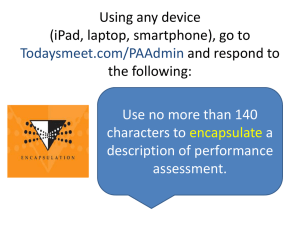Deepening Learning: Strategies and Examples Residency 1
advertisement
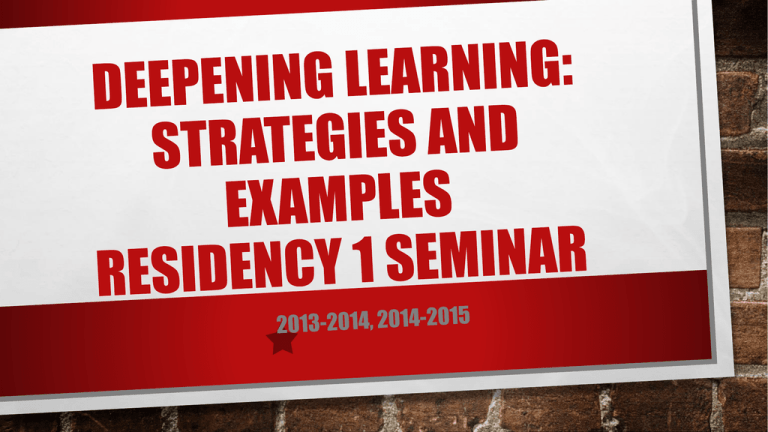
LINDA KAY DAVIS, ED.D, PRESENTER ASSOCIATE PROFESSOR DEPARTMENT OF LANGUAGES AND LITERATURE COORDINATOR, RESIDENCY 1, COLLEGE OF ARTS AND LETTERS, AUSTIN PEAY STATE UNIVERSITY WHAT IS DEEP LEARNING? “Deeper learning is simply what highly effective educators have always provided: Delivery of rich core content to students in innovative ways Students first learning and then applying what they learn Rigorous core content True deeper learning is developing competencies that enable graduating high school students to be college and career ready and then make maximum use of their knowledge in life and work” (Alliance for Effective Educaton 1). WORDS RELATED TO DEEPENING LEARNING • • • • • SCAFFOLD ● CORRECT EARLIER MISCONCEPTIONS RELEASE RESPONSIBILITY ● PRACTICE SKILLS, PROCESSES, AND STRATEGIES MASTER CORE ACADEMIC CONTENT ● PROVIDED FOR ALL STUDENTS EXAMINE CONTENT IN NEW WAYS ● THINK CRITICALLY ADD NEW INFORMATION ● COLLABORATE ● ACADEMIC MINDSET ● LEARNING HOW TO LEARN THEORIES RELATED TO DEEPENING LEARNING SCHEMA DEVELOPMENT: Schemata are the means by which knowledge is arranged and warehoused. (Anderson, 1995, Bransford & Johnson, 1973, ; Winograd, 1975, cited in Marzano) Three types of schema development: Accretion—gaining knowledge Tuning—adjusting or modifying knowledge Restructuring—rearranging knowledge to acquire new perceptions PIAGET AND SCHEMA • Accretion and tuning are similar to Piaget’s assimilation because new knowledge is gradually connected to prior knowledge. • Restructuring is similar to Piaget’s accommodation because in this stage new learnings challenge current insights and views (Marzano 2007). TWO TYPES OF KNOWLEDGE • Procedural—skills, strategies, and procedures • Examples: adding two digits, editing a composition for punctuation, “sounding out a new word, shooting a free throw” (Marzano, 2007) • Declarative—information • Examples: timeline for historical events, characteristics of fiction, characteristics of DNA, rules of soccer HOW TO DEEPEN PROCEDURAL KNOWLEDGE • Procedural deepens with practice that increases, removes, and alters steps. Gradually these procedures become automatic, accomplished without thought. Sometimes fluency is a word used to describe automatic full development of this type of knowledge. • Good teachers take time to help learners develop procedural knowledge over time. Procedural knowledge is not, however, accomplished with rote drill. Guided practice that teaches students to organize, review, rehearse, summarize, compare, and contrast is the key according to Rosenshine (cited in Marzano, 2007, 62). HOW TO DEEPEN DECLARATIVE KNOWLEDGE • Reviewing and revising are the keys. • Students need “at least four exposures to new declarative knowledge to adequately integrate it into their existing knowledge bases” (Nuthall cited in Marzano, 2007, 62). • These exposures need to occur no more that 48 hours apart (Roveee,-Collier, 1995; cited in Marzano, 2007, 62). • Students need time to think about what they have learned. Strategies for Deepening Declarative Knowledge with Revision • Repeated structured and guided exposures so that unclear thinking becomes clearer and knowledge is added. • Repeated opportunities to add new information, fix mistakes, and refine meaning (especially important today with the CCSS demands that students write and speak argumentatively) • Error analysis considered by some to be a major academic skill. (Costa Cited in Marzano, 2007 63)) STRATEGIES FOR DEEPENING DECLARATIVE KNOWLEDGE WITH REVISION • HOMEWORK • Seems to have little effect on achievement at lower grades, but might help develop study skills • Needs to be small chunks of meaningful work that will increase declarative knowledge. (Marzano, 2007, 67-69). • IDENTIFY SIMILARITIES AND DIFFERENCES • Comparing, classifying, creating metaphors, and creating analogies • Using graphic organizers, Venn diagrams, sentence frames, double bubbles, comparison matrixes, Classification charts, metaphor charts (Marzano, 2007, 72-77) MORE STRATEGIES FOR DEEPENING DECLARATIVE KNOWLEDGE WITH REVISION • Teach students to identify errors in their thinking including faulty logic: • Contradiction • Accident • False cause • Begging the question ● Evading the issue ● Arguing from ignorance ● Composition /division • See Marzano, 2007, 2009. The Art and Science of Teaching for additional information. MORE STRATEGIES FOR DEEPENING LEARNING • Gradually lessen the structure and vary the requirements • When deepening procedural knowledge, consider whether becoming proficient is a life skill. • Provide charts so that students are aware of their progress • Consider using collaborative groups after independent practice. • Begin monitored work in class and assign for homework. • Send parents directions for procedural homework. SIX COMPETENCIES STRENGTHENED WITH DEEPER LEARNING • Mastery of core content • Thinking critically and solving complex problems • Working collaboratively • Communicating effectively • Learning how to learn • Developing academic mindsets See “Deeper Learning Defined” April 2013 HP Foundation. BENEFITS FOR STUDENTS IN A CLASSROOM WITH A FOCUS ON DEEPER LEARNING • Motivated and challenged students • Students who not only can learn about knowledge and skills but also can apply skills to new situations. • Students who can connect learning to their lives • Students who develop an academic MINDSET • Students who can evaluate their own errors in procedures and use of knowledge • Students who can adjust their thinking and correct their own errors • Thus, students who are self-regulating because they have internalized information, knowledge, skills (Carl Roger’s principles of self-directed learning) • “A Time for Deeper Learning: Preparing Students for a Changing World. ” Alliance for Excellent Education (2011, p. 3) CHALLENGE AT THE HEART OF DEEPER LEARNING • HTTPS://WWW.TEACHINGCHANNEL.ORG/VIDEOS/DEEPER-LEARNING-A-SERIES-OVERVIEW • HTTPS://WWW.TEACHINGCHANNEL.ORG/VIDEOS/DEEPER-LEARNING-CHALLENGES-STUDENTS-EXL • HTTP://WWW.HEWLETT.ORG/PROGRAMS/EDUCATION/DEEPER-LEARNING/WHAT-DEEPER-LEARNING WORKS CITED Alliance for Excellent Education. (May 2011). A time for deeper learning: Preparing students for a changing world. Washington, D.C.: Alliance for Excellent Education. Retrieved from http://all4ed.org/reports-factsheets/a-time-for-deeper-learning-preparing-students-for-achanging-world/. Deeper learning defined ( April 2013). The William and Flora Hewlett Foundation. Retrieved from www.hewlet.org/uploads/ document/Deeper_Learning_Defined_April_April.pdf Marzano, Robert J. (2007). The art and science of teaching. [e-book] EBSCO. OTHER RESOURCES FOR DEEPENING LEARNING DEEPER LEARNING FOR EVERY STUDENT: • HTTP://WWW.HEWLETT.ORG/SITES/DEFAULT/FILES/DEEPER%20LEARNING%20FOR%20EVERY%20STUDENT%20EVERY%20DAY_GETTING%20SMART_1.2014.PDF READINGS FOR LEARNING ABOUT DEEPENING LEARNING: • HTTPS://WWW.TEACHINGCHANNEL.ORG/BLOG/2014/03/21/DEEPER-LEARNING-READING-LIST/ SPOTLIGHT ON DEEPER LEARNING FROM EDUCATION WEEK: • HTTP://WWW.EDWEEK.ORG/EW/MARKETPLACE/PRODUCTS/SPOTLIGHT-DEEPER-LEARNING.HTML HOW PLANNING FOR PROCESSING TIME FOR STUDENTS HELPS TO DEEPEN LEARNING: • HTTP://WWW.SALUDASCHOOLS.ORG/SITE/DEFAULT.ASPX?PAGETYPE=3&MODULEINSTANCEID=3483&VIEWID=7B97F7ED-8E5E-4120-848FA8B4987D588F&RENDERLOC=0&FLEXDATAID=5865&PAGEID=3103 OTHER RESOURCES FOR DEEPENING LEARNING The Art of Planning for Deeper Learning: http://totallylearnedas.com/2014/08/10/the-art-of-timing deeper-learning/ http://edlights.com/blog-the-abcs-of-deeper-learning-part-2 The Nature of Learning: http://www.oecd.org/edu/ceri/50300814.pdf How Global Competency can Deepen Learning: http://asiasociety.org/files/book-globalcompetence.pdf Assessment: Asking Questions to Deepen Learning: http://totallylearnedas.com/2014/08/10/the-art-of-timing-deeper-learning/ OTHER RESOURCES FOR DEEPENING LEARNING THE NATURE OF LEARNING: • HTTP://WWW.OECD.ORG/EDU/CERI/50300814.PDF HOW GLOBAL COMPETENCY CAN DEEPEN LEARNING: • HTTP://ASIASOCIETY.ORG/FILES/BOOK-GLOBALCOMPETENCE.PDF USING ACTIVE LEARNING TO ENHANCE LEARNING • HTTP://WWW.CTE.CORNELL.EDU/DOCUMENTS/PRESENTATIONS/EISEN-HANDOUT.PDF DEEPENING LEARNING IN AP AND HONORS (ADVANCED) LEVEL COURSES IN HIGH SCHOOL: • HTTP://SCHOLARWORKS.GVSU.EDU/CGI/VIEWCONTENT.CGI?ARTICLE=1053&CONTEXT=TFR OTHER RESOURCES FOR DEEPENING LEARNING FOSTERING DEEPER LEARNING THROUGH FEEDBACK IN A SPANISH CLASS (GOOD IDEAS IN GENERAL, TOO) • • • • • HTTP://BLOG.CALICOSPANISH.COM/2014/04/21/FOSTERING-DEEPER-LEARNING-THROUGH-FEEDBACK.HTML DEEPENING LEARNING IN MATHEMATICS CLASSES: FILES.ERIC.ED.GOV/FULLTEXT/ED544239.PDF HTTP://WWW.DONORSCHOOSE.ORG/PROJECT/DEEPENING-ALGEBRA-LEARNING/1157454/ HTTPS://WWW.NCETM.ORG.UK/CPD/39533 NEUROSCIENCE AND DEEPENING LEARNING HTTP://WWW.EDWEEK.ORG/TM/ARTICLES/2012/03/27/TLN_PILLARS_NEUROSCIENCE.HTML?TKN=PTCFBFRS2P2OOBRODE%2FKUTOFIZ%2BJAEHEUKQE
